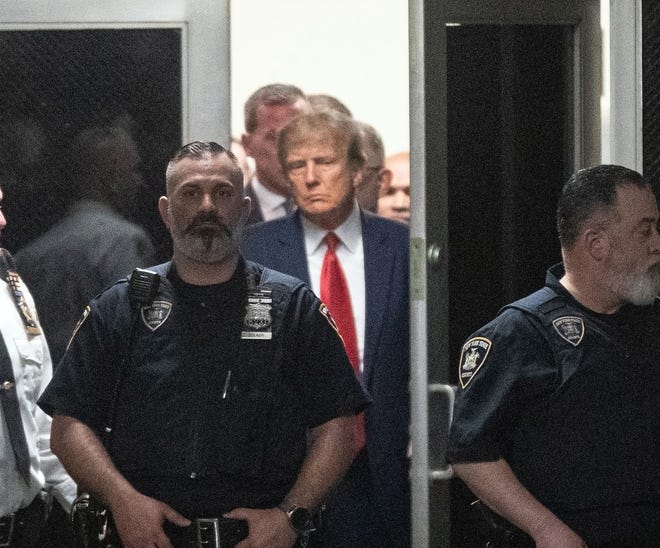[ad_1]
For the first time in U.S. history, a former president surrendered to law enforcement and was placed under arrest.
Donald Trump’s arraignment Tuesday thrust the U.S. criminal justice system into dramatically new territory, testing the durability of courtroom rules and legal procedures that apply to all Americans – this time, the 45th chief executive of the nation.
Stay in the conversation on politics: Sign up for the OnPolitics newsletter
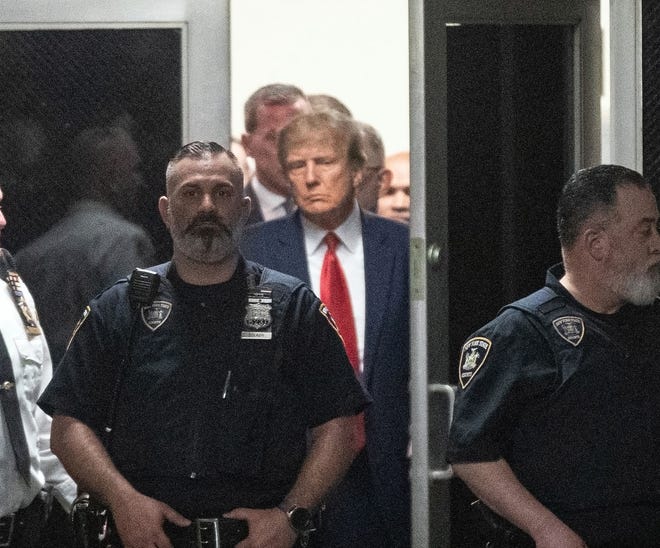
Here are takeaways from Trump’s arrest.
34 counts
In an indictment unsealed Tuesday, Bragg charged Trump with 34 felony counts for falsifying New York business records through a “catch and kill” scheme designed to conceal damaging information and unlawful activity before the 2016 election.
Trump, appearing before Judge Juan Merchan, pleaded not guilty to each of the counts.
The crux of the case centers on $130,000 in hush money payments that Trump’s then-fixer Michael Cohen made to adult film star Stormy Daniels. Prosecutors also outlined a $30,000 payment to a former Trump Tower doorman “who claimed to have a story about a child Trump had out of wedlock.”
And they referenced a separate $150,000 payment to former Playboy model Karen McDougal to silence her about an alleged affair prior to the 2016 election. Prosecutors said the later two payments were facilitated by American Media Inc., whicht owns and operates the National Enquirer tabloid.
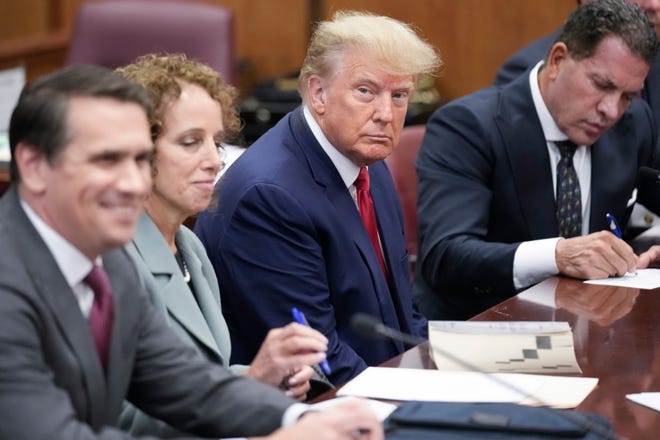
There’s no state law that prohibits hush money payments. But Bragg said Trump falsified business records by concealing monthly reimbursement payments he made to Cohen as checks for legal services.
By itself, falsifying business records is a misdemeanor under New York law. Bragg charged Trump with more serious felony counts by arguing the records were falsified to cover up other crimes.
“Why did Donald Trump repeatedly make these false statements?” Bragg said. “The evidence will show that he did so to cover up crimes relating to the 2016 election.”
Although the indictment doesn’t specify which additional crimes, Bragg said Trump violated New York election law and federal campaign finance law. .
Trump defiant in Mar-a-Lago speech
Hours after leaving the New York City court, Trump returned to his resort in Palm Beach, Florida where he delivered a speech listing multiple grievances from Tuesday’s arrest and last year’s FBI search at Mar-a-Lago over classified records to President Joe Biden’s son and losing the 2020 election.
“This fake case was brought only to interfere with the upcoming 2024 election and it should be dropped immediately,” he said.
Romney, other Trump critics skeptical of Bragg’s case
Even some of Trump’s biggest critics were quick to question whether Bragg presented enough new information to warrant the charges.
“I believe President Trump’s character and conduct make him unfit for office,” Sen. Mitt Romney, R-Utah, who voted to remove Trump from office during the ex-president’s second impeachment trial, said in a statement.
“Even so, I believe the New York prosecutor has stretched to reach felony criminal charges in order to fit a political agenda.”

John Bolton, Trump’s former national security advisor-turned-critic, questioned whether Trump’s hush payments represented a campaign contribution or expenditure under federal law.
“Speaking as someone who very strongly does not want Donald Trump to get the Republican presidential nomination, I’m extraordinarily distressed by this document,” Bolton said in an interview on CNN. “I think this is even weaker than I feared it would be. And I think it’s easily subject to being quickly dismissed.”
All eyes on Alvin Bragg
Manhattan District Attorney Alvin Bragg will arguably be as much the center of attention in this case as Trump.
“We cannot and will not normalize serious criminal conduct,” he said, defending bringing the case forward at a news conference after Trump appeared in court.
The district attorney said a “trail of money and lies exposes a pattern” that violates New York’s basic and fundamental business laws.
For Republicans, Bragg will be a lightning rod for their assertions that this case is at best a campaign promise and at worse a political persecution.
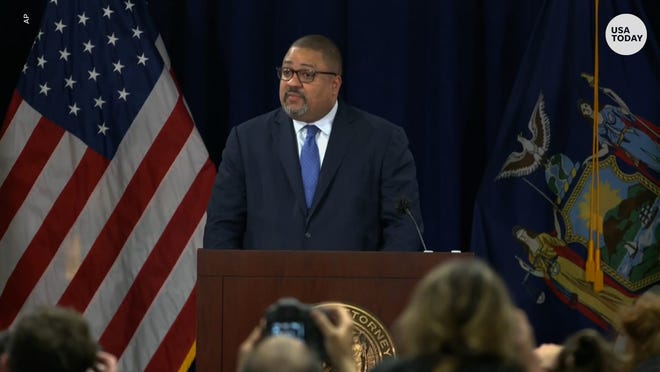
More: Read the indictment. Donald Trump charged with crimes in New York.
During the 2021 campaign for Manhattan district attorney, for instance, Bragg reportedly reminded voters that he sued the Trump administration “more than a hundred times” in his old job as assistant New York attorney general.
Democrats, meanwhile, have largely emphasized how the justice system needs to play out without prejudice or favor.
Others have called attention to how Bragg, who is Black, has faced a barrage of death threats and racists email messages since the indictment was handed down by a grand jury.
A courthouse circus amplified by members of Congress
Hours before Trump arrived to turn himself in, throngs of foes and fans had assembled at small a park near the courthouse.
Among them were two polarizing Republican lawmakers, Reps. Marjorie Taylor Greene, of Georgia, and George Santos, of New York, who joined the pro-Trump side that was waving flags and blowing whistles.
“The government has been weaponized against him,” Greene said. “I’m here to protest and use my voice to take a stand. Every American should take a stand.”
Politics: Marjorie Taylor Greene compares Trump to Jesus before his arrest and arraignment in New York
More: New York City Mayor Eric Adams warns Marjorie Taylor Greene, others ahead of Trump arraignment
Later, Greene compared Trump to Jesus and Nelson Mandela in an interview with Right Side Broadcasting.
Among the anti-Trump demonstrators was Democratic Rep. Jamaal Bowman of New York, who shouted at Greene’s vehicle when it departed.
“Get your hateful rhetoric out of New York City,” Bowman said via Twitter. “Democracy is all about love.”
The White House keeps quiet
Tuesday’s circus-like atmosphere provided a striking split screen: a former president under arrest and the current president, Joe Biden, trying his best to act like he’s not paying attention.
As Trump walked out of his vehicle to surrender at the Manhattan courthouse, White House press secretary Karine Jean-Pierre was in the middle of a press briefing, declining to comment to question after question about the Trump case.
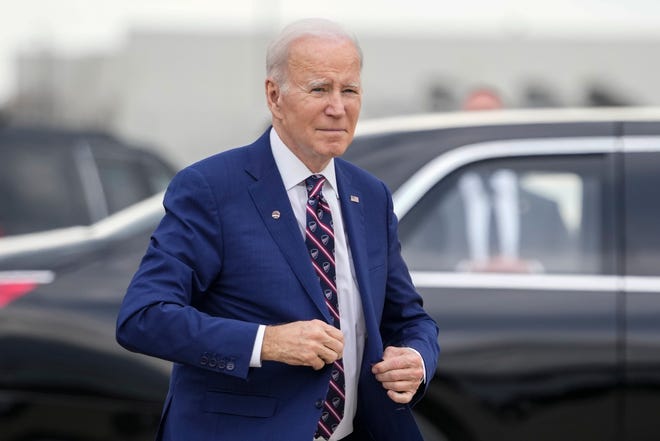
“Obviously he (Biden) will catch part of the news when he has a moment to catch up on the news of the day,” Jean-Pierre said at her daily briefing. “But this is not his focus for today.”
More:With 2024 looming, how long can President Biden stay silent on Trump’s indictment?
Jean-Pierre cited the ongoing nature of the case in declining comment. Biden ignored questions shouted by reporters about Trump’s case after declining comment last week.
Anything Biden says could be used by Republicans to reinforce their case of a politically biased government and justice system.
But Biden’s strategy of silence will be tested if Biden formally announces a 2024 reelection bid, which he’s widely expected to do. If Biden remains silent, then Trump’s claims of a rigged justice system – almost certain to ramp up heading into 2024 – would go unchallenged by the likely Democratic standard-bearer.
How long can Biden stay quiet on such a significant case – especially one with direct implications on his own political future?
No mugshot, but Trump fakes one to raise money
Heading into the proceedings, it was unclear whether Trump would be held to the same standards as other defendants by getting fingerprinted and photographed for a mug shot.
In the end, Trump was required to provide fingerprints but was not subjected to a mug shot or handcuffs. A person familiar with the matter said the decision was ultimately made by Bragg’s office.

That didn’t stop the Trump campaign from creating its own Trump mug shot to raise money, however.
Within minutes of the former president being processed his 2024 campaign team put out its own “mugshot” with a picture of Trump over a “not guilty” banner in a fundraising email.
Politics: After arrest what’s next legally and politically for the former president?
Trump has used his indictment to rally Republicans, with even some of his potential Republican opponents accusing law enforcement of being weaponized against Trump.
Campaign officials said Trump had $10 million in donations since the indictment last week.
The judge also did not order a gag order, meaning the former president can speak freely about the case without concern about repercussions in court.
Reach Joey Garrison on Twitter @joeygarrison and Phillip M. Bailey @phillipmbailey
[ad_2]
Source link





